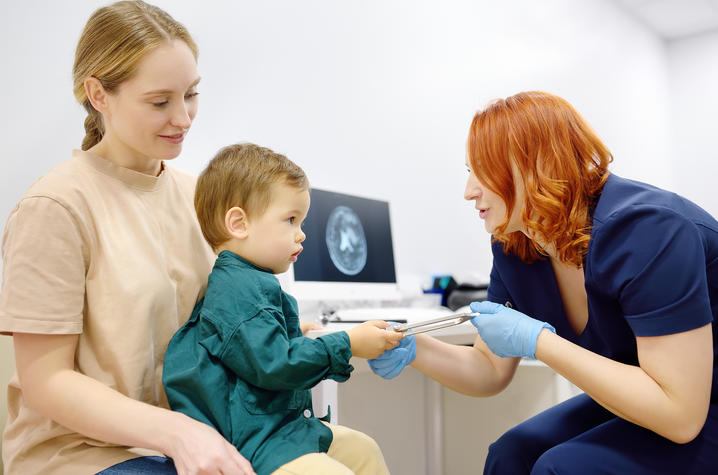Specialized neurologic care enhances quality of life for children, families

The University of Kentucky Public Relations & Strategic Communications Office provides a weekly health column available for use and reprint by news media. This week’s column is by David Neil Toupin, M.D., a child neurologist with Kentucky Children’s Hospital and Kentucky Neuroscience Institute.
LEXINGTON, Ky. (Sept. 3, 2024) - As a neurologist specializing in the care of children with complex neurologic diseases, I’ve seen firsthand the profound impact that compassionate and personalized care can have on the lives of children and their families. Whether conditions have exciting new treatments — as in Spinal Muscular Atrophy (SMA) or Duchenne Muscular Dystrophy (DMD) — or in situations where treatments have yet to be developed, a personalized and multidisciplinary approach allows for optimal care.
Children with complex neurologic diseases often face a range of challenges. Challenges may be related to health conditions, such as breathing difficulties, scoliosis or seizures; developmental problems, such as motor or speech delays; or psychosocial problems, relating to school, community or home functioning. Early intervention by a team of specialists — physicians, therapists, genetic counselors, social workers — is crucial. A collaborative approach ensures that every aspect of the child’s health and well-being is addressed, improving their quality of life.
Specialty care allows for the use of advanced diagnostic tools and treatment options tailored to each child’s unique needs. For example, recent breakthroughs in gene therapy for SMA and DMD have revolutionized care, offering hope to families who previously had limited options. These treatments, however, require careful coordination among multiple specialists who understand the nuances of these diseases.
Moreover, multidisciplinary, specialized care provides invaluable support to families. The journey of caring for a child with a complex neurologic disease is fraught with emotional, physical and financial challenges. Specialists not only provide medical care but also connect families with resources and support networks, helping them navigate the complexities of their child’s condition.
Specialized care is not just about treating a condition; it’s about offering a comprehensive, compassionate approach that considers the whole child and their family. For all children with complex disorders, specialized care is essential, providing them the best chance to thrive, both now, and in the years ahead.
UK HealthCare is the hospitals and clinics of the University of Kentucky. But it is so much more. It is more than 10,000 dedicated health care professionals committed to providing advanced subspecialty care for the most critically injured and ill patients from the Commonwealth and beyond. It also is the home of the state’s only National Cancer Institute (NCI)-designated Comprehensive Cancer Center, a Level IV Neonatal Intensive Care Unit that cares for the tiniest and sickest newborns and the region’s only Level 1 trauma center.
As an academic research institution, we are continuously pursuing the next generation of cures, treatments, protocols and policies. Our discoveries have the potential to change what’s medically possible within our lifetimes. Our educators and thought leaders are transforming the health care landscape as our six health professions colleges teach the next generation of doctors, nurses, pharmacists and other health care professionals, spreading the highest standards of care. UK HealthCare is the power of advanced medicine committed to creating a healthier Kentucky, now and for generations to come.




